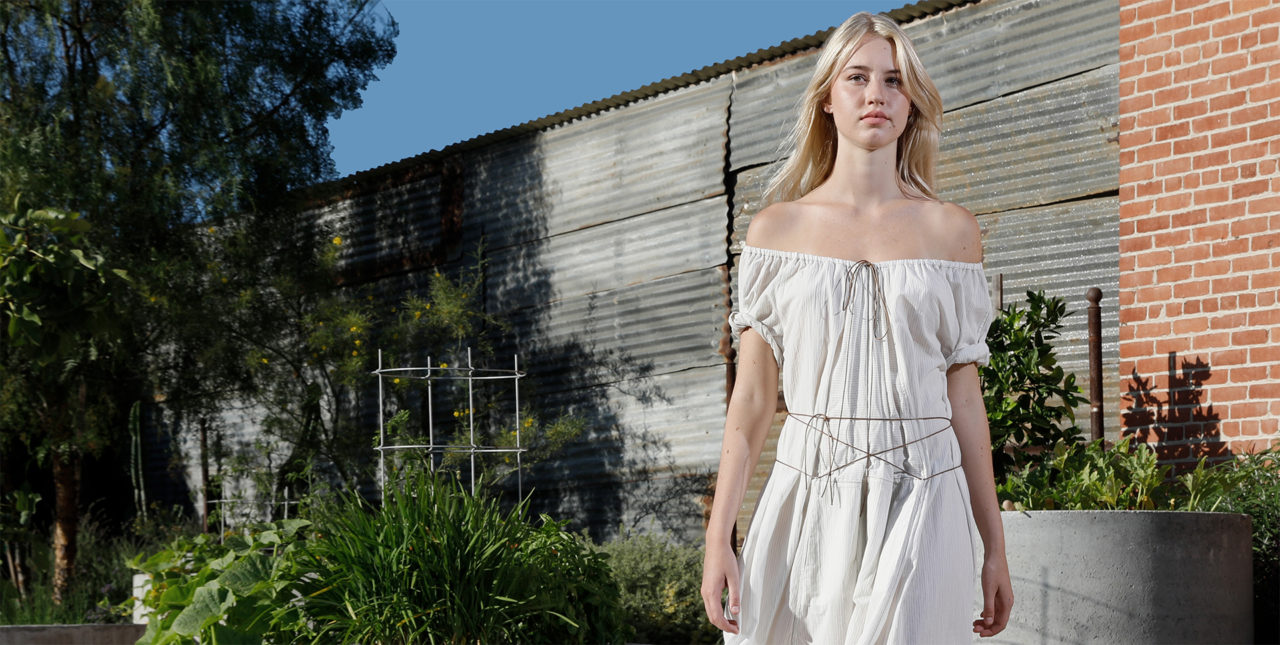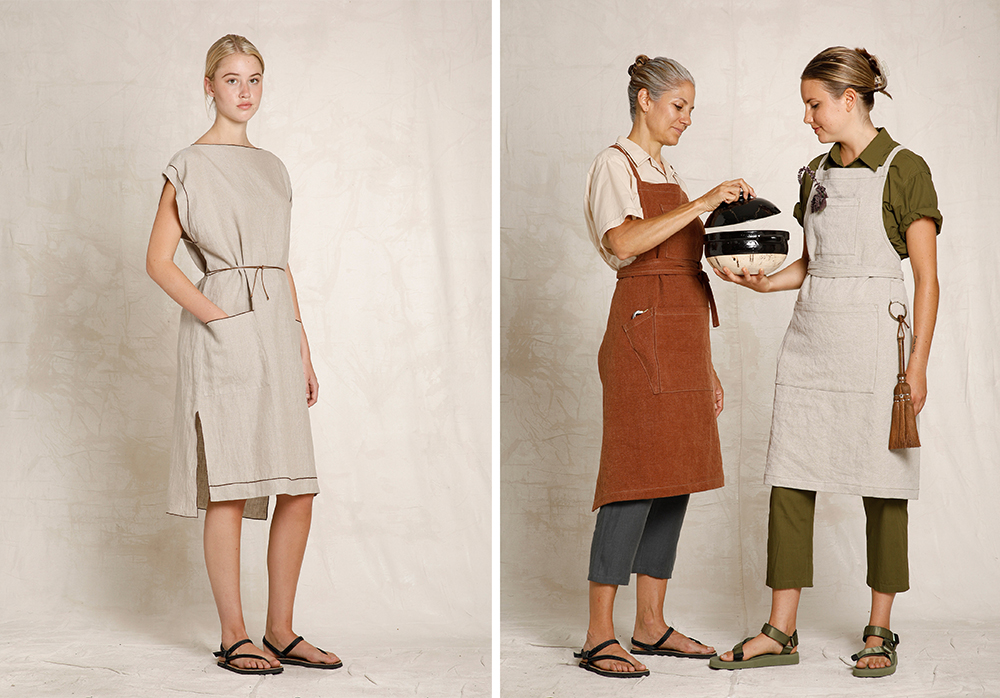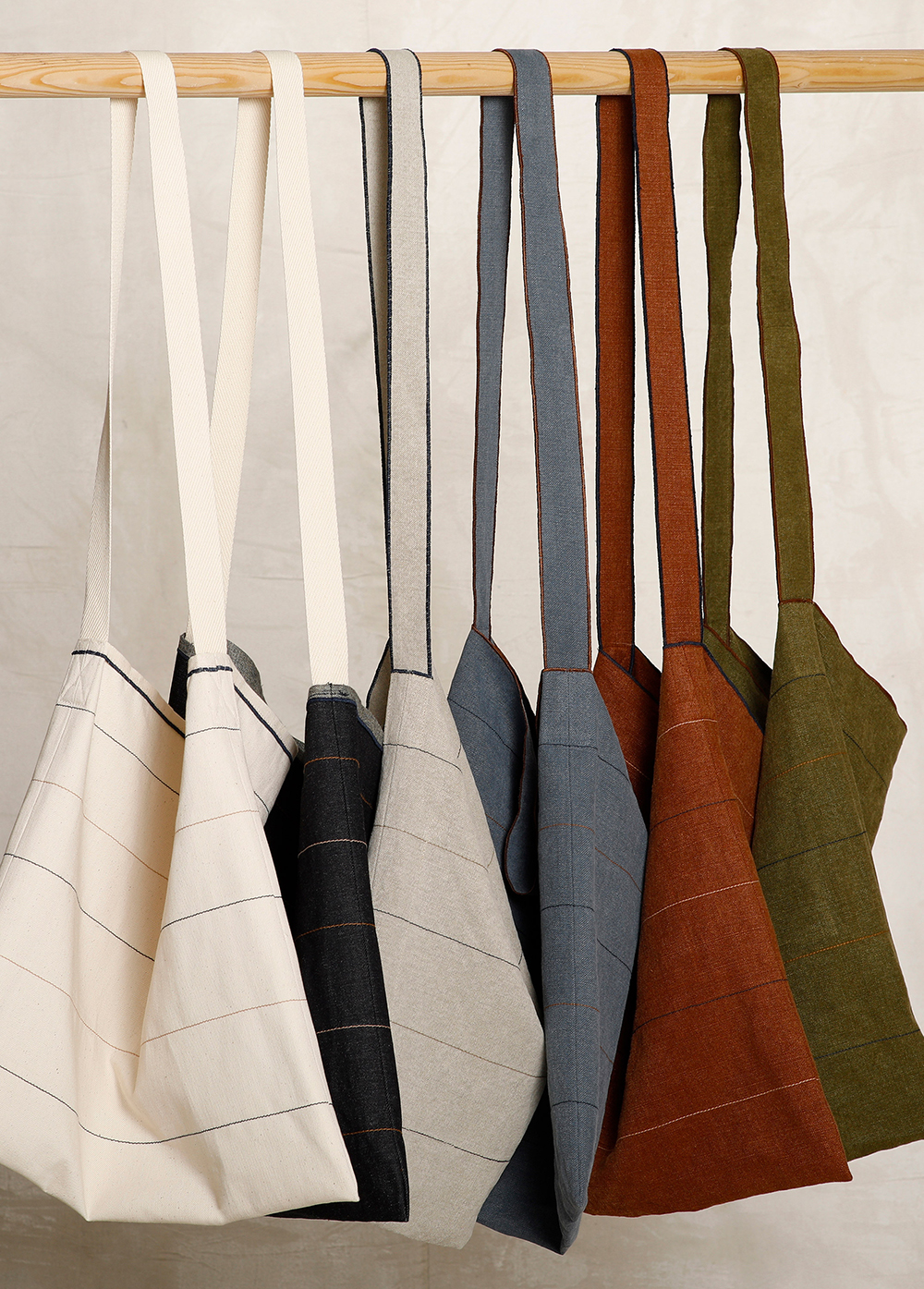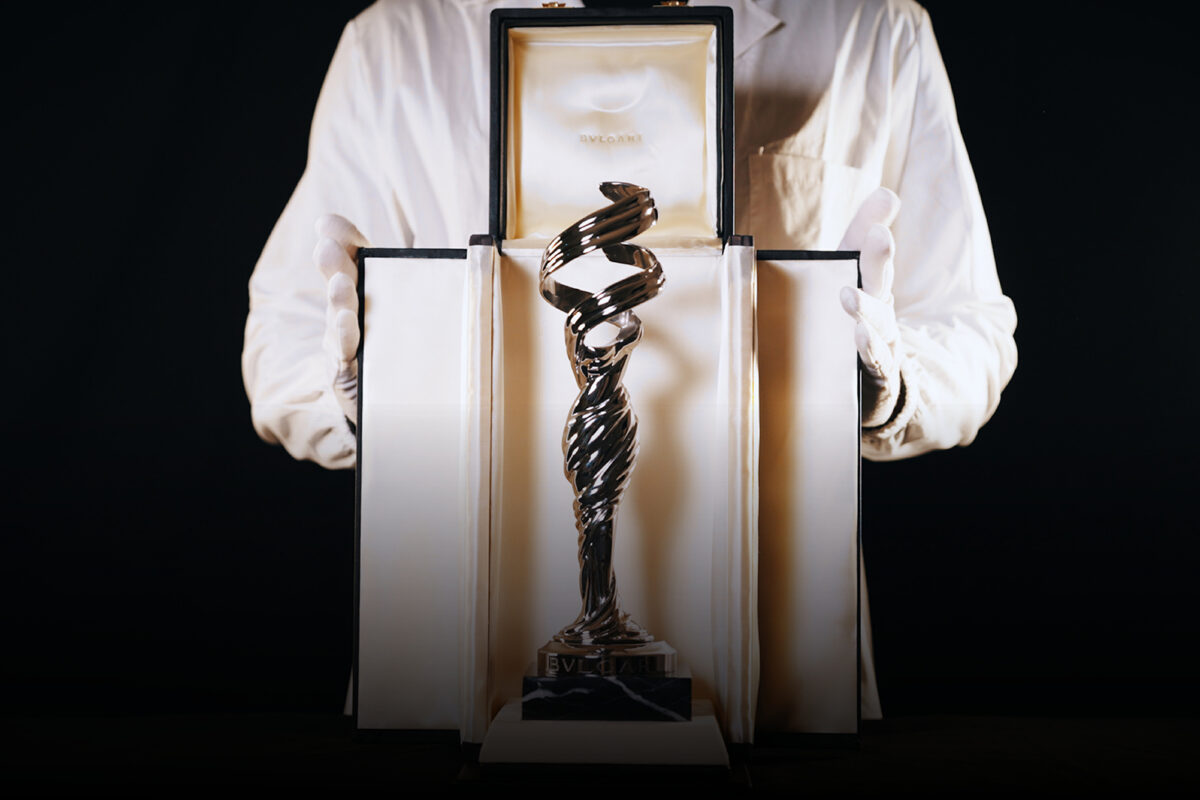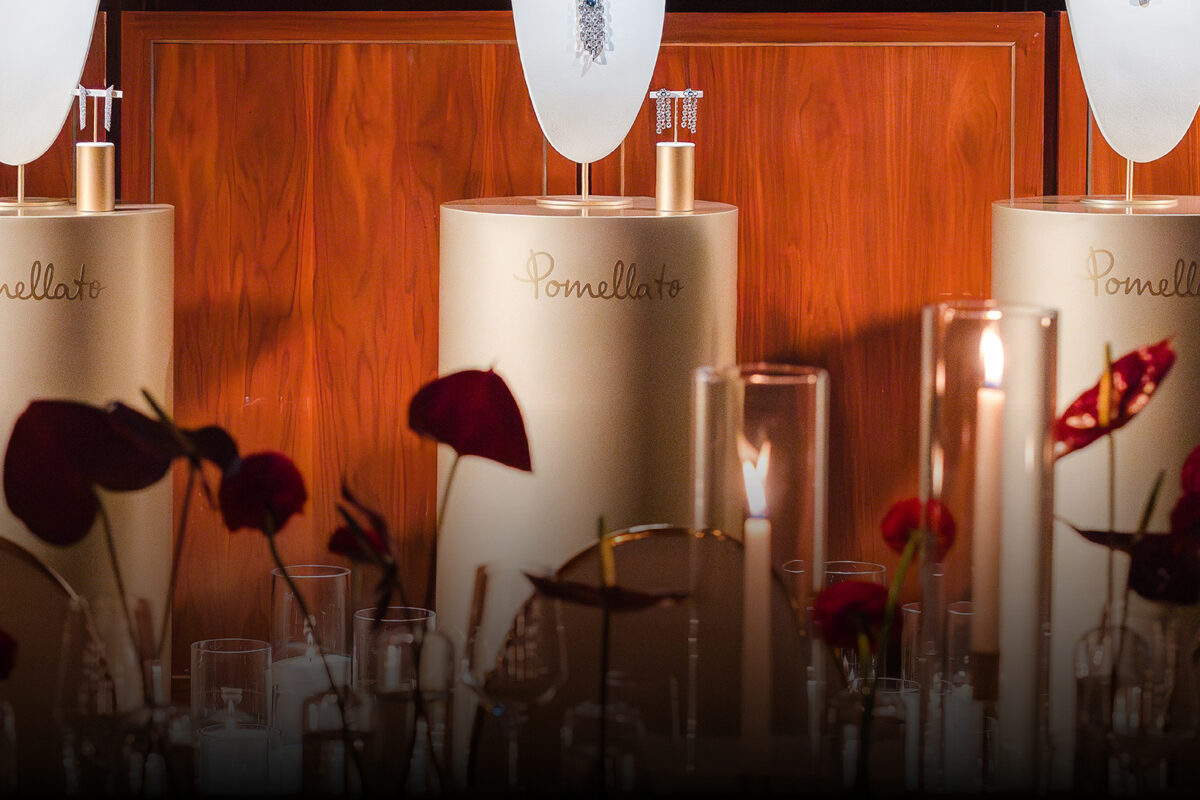L.A. brand Flora Animalia brings elegance to working outdoors
Words by RACHEL MARLOWE
The pandemic has led to a renewed obsession with gardening and growing your own produce; meanwhile, stay-at-home style has become a category in its own right. Enter Flora Animalia: a line of elegant yet functional gardening apparel created by Los Angeles fashion designer Rozae Nichols that lies at the intersection of both, offering up a utilitarian approach to luxury workwear for the aesthetically minded homesteader.
Garden chic: the Pheasant Dress ($475) in 100% GOTS certified organic stripe cotton lawn.
Launched in August, with a forthcoming pop-up at organic design mecca Garde’s Summerland store Nov. 20-22, the label is dedicated to creating heirloom-quality apparel and accessories that are practical, comfortable and sustainably designed for the garden and beyond. “It’s not fashion but good essentials that serve you,” Nichols says. “These are pieces that speak to the moment, which is really about ease and comfort without going to your sweatpants every day.”
A veteran of the fashion scene, Nichols launched her namesake label in 1993, followed by the colorful, printcentric — and massively successful — line Clover Canyon in 2011, the latter of which has been seen on such luminaries as Beyoncé, Gwyneth Paltrow and Michelle Obama. Surprising everyone, in 2016 she shuttered her business and stepped away from the industry. “I was burnt out,” she says. “I just wanted to scale back and get away from all the noise.”
(LEFT) The Farmers Market Dress ($325). (RIGHT) Unisex Workers Apron ($190) crafted in 100% clean crop to mill Belgian linen.
A longtime animal rights and environmental activist, Nichols turned her attention toward a new project — a community garden. “The idea was to find a space with an art studio for myself and a big garden to host workshops focused on food, art, culture and the environment,” she explains. “I wasn’t thinking about fashion at all.”
“I was resisting designing again, but I wanted practical, serviceable workwear pieces for what I was doing out here”
After finding a commercial building with a large backyard in L.A.’s Mid-City neighborhood, Nichols got to work transforming it into an urban oasis featuring an edible garden with passionfruit vines; citrus, olive and pink pepper trees; and raised plant beds fashioned from cuts of concrete water pipes containing carrots, tomatoes, tubers and herbs. “It took two years, and I absolutely fell in love with gardening at a larger scale,” she says. “I wasn’t that familiar with edible gardening, so I took a lot of classes and did a lot of reading. Through it, I became very connected to the process.”
Coordinated Market bags ($150) in linen and 100% GOTS certified organic denim feature her signature marrow and top stitching.
It was while working in the garden, however, that Nichols found herself thinking about designing again. “I wasn’t finding a gardening apron that had everything I wanted, so I made one,” she says. “I was resisting it because I didn’t want to make clothes, but I wanted practical, serviceable workwear pieces for what I was doing out here.”
After creating her ideal apron, Nichols started fashioning gardening dresses and ponchos, jeans and utilitarian worker jackets. “I was testing the waters to see how it felt,” she explains. “I was patterning and cutting the pieces myself, and I really got into it. It was an ambivalent few months, but ultimately, this is what I know, so I decided to make a collection of strong pieces that really addressed what I wanted to wear in the garden and, beyond that, were consistent with my values and where I am right now.”
The Farmers Market Dress Denim ($325) and Garden Visor ($125) in a lightweight 100% GOTS certified denim.
After a series of delays caused by the pandemic, in late summer Flora Animalia launched online its first collection of cut-and-sewn pieces, all made in studio, using GOTS-certified organic fabrics and Belgian linens online. Nichols’ original vision of the perfect pinafore apron was joined by a range of simple yet stylish apronettes, half aprons and smock aprons in linen and organic denim, all featuring multiple, purposefully placed pockets for tools, seeds, weeds and a signature utility ring (Nichols likes to keep her gardening towels looped through these).
Romantic yet functional blouses with bell sleeves for ease of movement and gardening dresses in cotton poplins include clever features like ties that allow the wearer to pull the hemline up to create a large harvest pocket. Unisex field shirts and shorts, linen ponchos with wide front pockets for gathering up freshly picked produce, and matching market bags are presented in a natural color palette of rusts, greens and ecrus. For dirtier work, organic cotton chambray shirts reminiscent of painter’s smocks can be layered over cargo pants or organic selvedge jeans; and denim takes the form of sturdy worker’s jackets and vests, jeans, drawstring skirts and sun visors.
At work in the Flora Animalia edible garden wearing the Harvest Pant ($225) in eco-friendly cotton/tencel fabric and workwear inspired poplin Short Sleeve Field Shirt ($250).
While Nichols says she plans to keep the offering small, the designer is already working on heavier pieces for cooler weather, including jumpsuits and cardigans, as well as a line of napkins, placemats, coasters and runners in Belgian linen exclusively for the forthcoming Garde pop-up. “I’ve been friends with Scotti [Sitz, a co-founder of Garde] for a long time, and she’s been very excited about the project,” Nichols shares. “She came over a few months ago and said, ‘I need this, and I need this, and I need this.’”
The Flora Animalia online shop also features a curated selection of stylish gardening tools to put in all those pockets, plus heirloom seeds to start your own edible garden, and enamel tableware on which to serve your homegrown produce.
Part of the Belgian Linen homewares collection Nichols designed exclusively for Garde Summerland.
“I want this collection to be about classic, perennial pieces that are beautiful in and of themselves because of the craftsmanship and integrity,” says Nichols of her unexpected return to fashion. “I’ve always believed in buying less, buying well and wearing it until you can’t wear it anymore. How do I reconcile with myself, ethically, to bring more things into the world? I do believe that if all of us in design demand more organic and sustainable fabrics, the more it helps to shift demand on the textile industry, and we can all help turn that ship around and into the direction it needs to go.”
Feature images: All photos courtesy of Flora Animalia.
Nov. 17, 2020
Discover more STYLE news.

